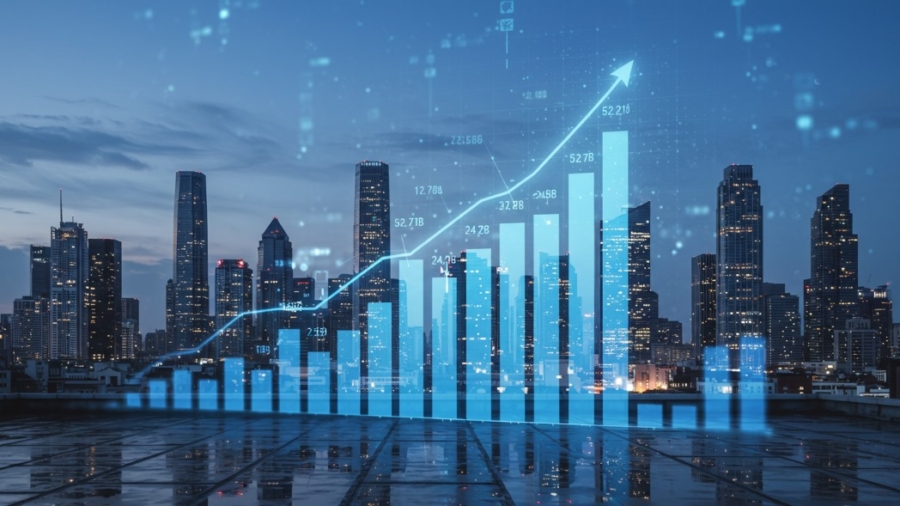Research Publication By Prof. MarkAnthony Nze
Institutional Affiliation:
New York Centre for Advanced Research (NYCAR)
Publication No.: NYCAR-TTR-2025-RP012
Date: June 10, 2025
DOI: https://doi.org/10.5281/zenodo.17397081
Peer Review Status:
This research paper was reviewed and approved under the internal editorial peer review framework of the New York Centre for Advanced Research (NYCAR) and The Thinkers’ Review. The process was handled independently by designated Editorial Board members in accordance with NYCAR’s Research Ethics Policy.
Nigeria’s macroeconomic structure has long been characterized by a resource-dependent, import-heavy, and low-complexity production model. Despite its abundant natural resources and demographic advantage, the country’s economic trajectory has remained cyclical, vulnerable to exogenous shocks, and structurally inefficient. To achieve inclusive and sustainable growth, Nigeria must execute a comprehensive trade and industrial reform strategy focused on diversification, competitiveness, value-chain integration, and institutional efficiency.
This paper posits that rebuilding Nigeria’s economy necessitates a shift from extractive to productive economics—anchored by structural industrial policy, pragmatic trade liberalization, and the strategic use of regional integration platforms such as the African Continental Free Trade Area (AfCFTA).
1.1 Structural Weaknesses and Historical Dependence
Nigeria’s economic fragility is rooted in decades of overreliance on crude oil exports, which accounted for over 90% of foreign exchange earnings in the past two decades (World Bank, 2023). The volatility of oil prices, coupled with a weak non-oil export base and underperforming manufacturing sector, has undermined balance of payments stability and fiscal resilience (CBN, 2023).
The country’s industrial capacity utilization remains below 55% (UNIDO, 2022), due in part to infrastructure deficits, low access to finance, inconsistent energy supply, and regulatory bottlenecks. Moreover, trade openness has been poorly sequenced, exposing infant industries to premature global competition without the institutional buffer of innovation or technology transfer mechanisms (Chinweoke and Olaniyi, 2022).
1.2 The Role of Trade in Economic Diversification
Trade policy in Nigeria must shift from a defensive to a developmental framework. The AfCFTA presents an opportunity to recalibrate Nigeria’s trade posture toward strategic regionalism. Proper implementation can allow the country to leverage economies of scale, reduce transaction costs, and access intermediate goods for domestic production (Adegbite, 2023; ITC, 2022).
However, to realize these gains, trade policy must be aligned with industrial policy. As WTO (2023) notes in its latest trade policy review, Nigeria needs to address tariff dispersion, non-tariff barriers, and customs inefficiencies to foster a predictable trade environment. Export-led industrialization, with deliberate support for backward and forward linkages, offers a pathway toward structural transformation (Ekpo, 2022).
1.3 Industrial Policy: A Framework for Re-Industrialization
Re-industrialization must be guided by targeted industrial policy—rooted in economic complexity theory and global value chain (GVC) integration. According to Gereffi (2021), GVC participation enables countries to specialize in segments of production without mastering entire industries, thus accelerating industrial learning.
Read also: NYCAR’s Disruptive Model: Blueprint for Global Education
Nigeria’s industrial clusters, such as those in Aba, Nnewi, and Kano, are underutilized due to weak institutional support and policy fragmentation (Aliyu and Dauda, 2022). A national industrial strategy must prioritize infrastructure densification, input localization, technology absorption, and research-commercialization linkages.
Fiscal incentives should be redesigned to favor tradable sectors with spillover potential, particularly agro-processing, light manufacturing, petrochemicals, and digital services. The current incentive regime, as evaluated by Ezeani and Bello (2023), lacks performance benchmarks and often benefits rent-seeking over productivity.
1.4 Investment Climate and Regulatory Reform
Rebuilding investor confidence requires structural improvements in Nigeria’s investment climate. The country ranked 131st on the 2020 World Bank Doing Business Index before its discontinuation—reflecting issues in contract enforcement, power supply, trade logistics, and regulatory transparency (NIPC, 2023).
The Medium-Term National Development Plan (2021–2025) outlines investment in special economic zones (SEZs), export processing zones (EPZs), and industrial parks as a means of catalyzing manufacturing growth (NPC, 2022). However, their success depends on clear governance models, land access frameworks, and investment in hard and soft infrastructure.
Moreover, exchange rate stability and inflation targeting remain essential to mitigate macroeconomic uncertainty and crowd in private investment (IMF, 2023).
1.5 The SME and Informal Sector Nexus
The informal sector accounts for over 50% of Nigeria’s GDP and 80% of employment (ILO, 2023). Any reform agenda that ignores this sector risks undermining inclusive growth. Strengthening micro, small, and medium enterprises (MSMEs) through access to finance, market linkages, and skills upgrading is critical.
Trade liberalization must be accompanied by domestic value chain strengthening to prevent de-industrialization via import surges. As the ITC (2022) outlines, MSMEs can only compete under AfCFTA if there is concurrent investment in quality infrastructure, product standards, and logistics systems.
1.6 Human Capital and Technological Catch-up
Industrial growth is dependent on a skilled labor force. Nigeria’s demographic dividend risks becoming a demographic liability without substantial investment in vocational training, STEM education, and managerial capabilities (AfDB, 2023).
Technological catch-up, as demonstrated by emerging Asian economies, must be facilitated through technology licensing, joint ventures, and industrial R&D. Public-private partnerships (PPPs) in industrial training institutes, incubators, and applied science hubs are necessary to close Nigeria’s innovation gap (WEF, 2022).
1.7 Macroeconomic Coordination and Policy Synergy
Nigeria’s current economic policy landscape suffers from fragmentation and weak policy coherence. The lack of synergy between trade, industrial, fiscal, and monetary policies has hindered reform implementation and investor confidence (Salami, 2023).
Policy harmonization requires the institutionalization of a national economic council with executive coordination powers. Real-time data from the National Bureau of Statistics (2024) and central bank research should feed into dynamic, adaptive policymaking frameworks (PWC, 2022).
Conclusively, rebuilding Nigeria’s economy through trade and industrial reform demands more than rhetorical commitment. It requires coordinated, evidence-based policymaking backed by institutional reform, macroeconomic discipline, and a strategic shift toward productivity-enhancing sectors.
Only by integrating trade liberalization with industrial deepening, investing in human capital, and fostering regional competitiveness can Nigeria transition from a rentier state to a diversified, innovation-driven economy. The time for bold, technocratic, and politically courageous reform is now.
References
World Bank (2023). Nigeria Economic Update. [online] Available at: https://www.worldbank.org/en/country/nigeria/publication/nigeria-economic-update
Central Bank of Nigeria (CBN) (2023). Annual Economic Report. [online] Available at: https://www.cbn.gov.ng/Out/2023/RSD/Annual%20Report.pdf
United Nations Industrial Development Organization (UNIDO) (2022). Industrial Development Report 2022. [online] Available at: https://www.unido.org/resources-publications-flagship-publications-industrial-development-report
Chinweoke, M. and Olaniyi, T. (2022). Trade Openness and Industrial Competitiveness in Nigeria. African Journal of Economic Policy.
Adegbite, A. (2023). Leveraging AfCFTA for Nigeria’s Trade Growth. African Trade Journal.
International Trade Centre (ITC) (2022). Promoting SME Competitiveness in Nigeria: AfCFTA Readiness. [online] Available at: https://www.intracen.org/publication/SME-Competitiveness-Nigeria-AfCFTA/
World Trade Organization (WTO) (2023). Trade Policy Review: Nigeria 2023. [online] Available at: https://www.wto.org/english/tratop_e/tpr_e/tp_rep_e.htm
Ekpo, A. (2022). Export-led Growth and Industrial Development in Nigeria. Nigerian Economic Society Conference Proceedings.
Gereffi, G. (2021). Global Value Chains and Development: Redefining the Contours of 21st Century Capitalism. [online] Available at: https://www.cambridge.org/core/books/global-value-chains-and-development/9F98F36C187E91B13F34F1AD9A7D6EAC
Aliyu, A. and Dauda, S. (2022). Policy Fragmentation and Industrial Cluster Development in Nigeria. Journal of African Development.
Ezeani, C. and Bello, Y. (2023). Reforming Industrial Incentives in Nigeria: A Performance-Based Approach. Nigerian Policy Review.
Nigerian Investment Promotion Commission (NIPC) (2023). Investment Climate Reform in Nigeria: Annual Report. [online] Available at: https://nipc.gov.ng/reports-publications/
National Planning Commission (NPC) (2022). Medium-Term National Development Plan 2021–2025. [online] Available at: https://nationalplanning.gov.ng/medium-term-national-development-plan-2021-2025/
International Monetary Fund (IMF) (2023). Nigeria: Staff Report for the 2023 Article IV Consultation. [online] Available at: https://www.imf.org/en/Countries/NGA
International Labour Organization (ILO) (2023). Nigeria Labour Market Profile. [online] Available at: https://www.ilo.org/global/about-the-ilo/how-the-ilo-works/multilateral-system/country-profiles/lang–en/index.htm
African Development Bank (AfDB) (2023). Nigeria Economic Outlook 2023. [online] Available at: https://www.afdb.org/en/countries-west-africa-nigeria/nigeria-economic-outlook
World Economic Forum (WEF) (2022). Closing Nigeria’s Innovation Gap: Building Skills for the Future. [online] Available at: https://www.weforum.org/agenda/archive/nigeria
Salami, A. (2023). Policy Coherence and Economic Governance in Nigeria. Brookings Africa Growth Initiative. [online] Available at: https://www.brookings.edu/topic/africa-growth-initiative/
National Bureau of Statistics (NBS) (2024). Real-Time Economic Indicators. [online] Available at: https://www.nigerianstat.gov.ng
PwC (2022). Nigeria Economic Outlook: Top 10 Themes for 2022. [online] Available at: https://www.pwc.com/ng/en/publications/nigeria-economic-outlook.html

